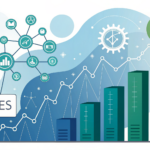The Role of Encryption in Ensuring CRM Data Security
Let’s face it, we live in a world where Customer Relationship Management (CRM) systems aren’t just helpful—they’re essential for businesses of all sizes. Think of them as central hubs for tons of customer data, making it easier to personalize interactions, smooth out processes, and make smart decisions. But here’s the catch: all that data also means serious security risks. CRM data encryption and security aren’t just nice-to-haves anymore; they’re absolutely crucial for keeping customer trust, playing by the rules, and protecting your business. In this guide, we’re going to dive into why encryption is a game-changer for CRM data encryption and security, look at some solid strategies for putting it into action, and talk about what the future holds for keeping data safe in the CRM world.
Why CRM Data Security Matters (Like, Really Matters)
CRM systems are basically goldmines of sensitive info. We’re talking customer contact details, what they’ve bought, their financial info, and all sorts of communications. This stuff is super valuable to cybercriminals, which makes CRM systems a big target. If you have a data breach, the consequences can be a nightmare:
- Money Problems: Think about the costs of recovering data, legal fees, fines, and compensating customers. Ouch.
- Bad Reputation: Losing customer trust can crush your brand, leading to fewer sales and customers jumping ship.
- Legal Headaches: Not following data protection rules like GDPR, CCPA, and HIPAA can mean massive fines and lawsuits.
- Total Chaos: A data breach can bring your business to a standstill, causing downtime and lost productivity.
So, yeah, having strong security measures isn’t just a good idea—it’s essential for staying alive in today’s digital jungle.
Encryption: Your CRM Data’s Best Friend
Encryption is a security superhero. It takes readable data (plaintext) and scrambles it into an unreadable mess (ciphertext). Without the right key, it’s like trying to read ancient hieroglyphics. In CRM, encryption is key for protecting data whether it’s sitting still (in databases or files) or on the move (traveling between systems or users).
How Encryption Works (Without Getting Too Geeky)
Encryption uses some seriously clever math to jumble up data, making it nearly impossible to crack without the right key. There are two main types:
- Symmetric Encryption: Uses the same key to lock and unlock the data. It’s quick, but you have to be super careful about sharing that key.
- Asymmetric Encryption: Uses a pair of keys—a public one for locking and a private one for unlocking. It’s more secure but a bit slower.
Why Bother with CRM Data Encryption?
- Keeps Things Confidential: Ensures only authorized people can see sensitive data, even if someone sneaks in.
- Follows the Rules: Helps you meet those pesky regulatory requirements for data protection.
- Builds Trust: Shows customers you’re serious about keeping their data safe.
- Lowers the Stakes: Makes stolen data useless, minimizing the impact of a breach.
Level Up Your Security: Best Practices for CRM Data Encryption and Security
Getting serious about CRM data encryption and security means hitting it from all angles—tech, policies, and training your team. Here’s how to do it right:
1. Lock Down Access
- Role-Based Access: Give different users different levels of access based on what they need to do. Sales folks get customer info, marketing gets leads, and so on.
- Principle of Least Privilege: Only give users the bare minimum access they need to do their jobs.
- Regular Check-Ups: Regularly review who has access to what and make sure it’s still necessary.
- Multi-Factor Authentication (MFA): Add an extra layer of security beyond just passwords. Think codes sent to phones or authenticator apps.
2. Encrypt Everything (Seriously)
- Data at Rest Encryption: Scramble sensitive data in your CRM databases and files. That includes contact info, financial data—anything confidential.
- Data in Transit Encryption: Use secure connections like SSL/TLS to encrypt data moving between your CRM, users, and other systems.
- Field-Level Encryption: Encrypt specific fields with sensitive info, like usernames, passwords, and social security numbers.
3. Back It Up Like Your Life Depends On It
- Automated Backups: Set up automatic backups to avoid human error and ensure it happens regularly.
- Offsite Backups: Store backups in multiple locations, including somewhere offsite, to protect against disasters.
- Test Restores: Regularly test your backups to make sure you can actually restore them if something goes wrong.
4. Stay Updated (Or Get Hacked)
- Patch Management: Apply security patches and bug fixes ASAP to close up vulnerabilities.
- Automated Updates: Automate updates to make sure you’re always protected.
- Testing: Test updates in a non-critical environment before rolling them out to the main system.
5. Know When to Let Go
- Data Minimization: Only keep data that you actually need.
- Retention Schedules: Decide how long to keep different types of data and stick to it.
- Secure Disposal: When data’s no longer needed, get rid of it securely to prevent unauthorized access.
6. Train Your Team (They’re Your First Line of Defense)
- Security Training: Regularly train employees about data security, phishing scams, and other threats.
- Awareness Programs: Create a security-focused culture in your organization.
- Incident Response: Have a plan for what to do if a data breach happens.
OmniCRM: A CRM That Takes Security Seriously
When you’re picking a CRM, security should be a top concern. OmniCRM is built with strong security features to keep your data safe.
What Makes OmniCRM Secure?
- Top-Notch Encryption: OmniCRM uses advanced encryption to protect data whether it’s sitting still or moving around.
- Tight Access Controls: You can set up detailed permissions to control who sees what.
- Multi-Factor Authentication: Adds an extra layer of security with MFA.
- Regular Check-Ups: OmniCRM undergoes regular security audits to find and fix any weaknesses.
- Compliance: OmniCRM follows industry-standard data protection rules.
The Future of CRM Data Security: What’s Next?
As cyber threats get more sophisticated, the future of CRM data encryption and security will depend on these trends:
1. Next-Level Encryption
- Homomorphic Encryption: Allows you to perform calculations on encrypted data without decrypting it first, which is pretty wild.
- Quantum-Resistant Encryption: Encryption that can withstand attacks from super-powerful quantum computers.
2. AI to the Rescue
- Threat Detection: AI can spot and respond to security threats in real-time.
- Anomaly Detection: Identify unusual activity that might indicate a breach.
3. Data Privacy Gets Serious
- More Scrutiny: Data privacy regulations are getting tougher, so you’ll need strong security measures.
- Global Standards: The rise of global standards will push everyone to adopt consistent security practices.
4. Cloud Security: Not an Afterthought
- Shared Responsibility: Understand that cloud security is a team effort. The provider secures the infrastructure, but you secure your data and applications.
- Cloud-Native Security: Use security tools designed specifically for the cloud to protect your CRM data.
In Conclusion
Let’s be real: CRM data encryption and security are non-negotiable in today’s world. By putting strong security measures in place, you protect customer data, build trust, and stay out of legal trouble. Encryption is a key piece of this puzzle, ensuring that data remains private even if the bad guys get in. As threats keep evolving, stay alert and keep updating your security. With a solid approach that includes encryption, access controls, backups, and training, your business can thrive in the digital age without constantly looking over its shoulder.
FAQ: CRM Data Encryption and Security
1. What’s CRM data encryption, and why should I care?
CRM data encryption turns your data into a secret code, protecting it from unauthorized access. It’s super important for keeping customers happy, following the rules, and protecting your business.
2. What’s so great about encrypting CRM data?
It keeps your data confidential, helps you comply with regulations, builds trust with customers, and reduces the damage from data breaches.
3. What are some must-do’s for CRM data security?
Lock down access, encrypt everything, back up regularly, keep software updated, know when to delete data, and train your employees.
4. How does OmniCRM keep my data safe?
OmniCRM uses strong encryption, lets you control access, offers multi-factor authentication, performs regular security checks, and complies with data protection regulations.
5. What’s on the horizon for CRM data security?
Keep an eye on advanced encryption, AI-powered threat detection, stricter data privacy rules, and better cloud security.



